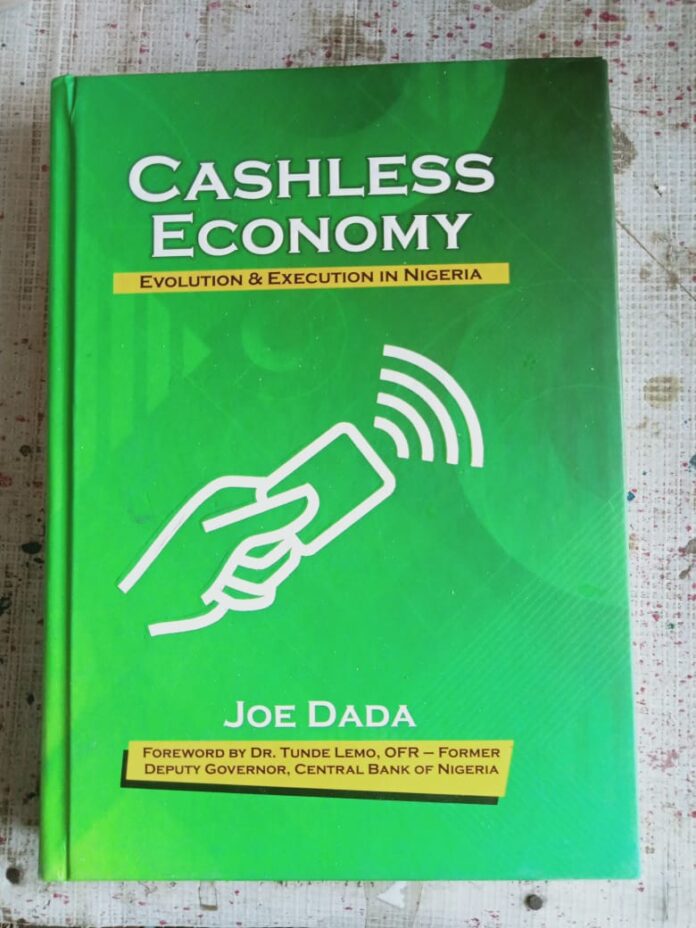This new book, which is a vivid description of our journey to a cashless economy in Nigeria, which commenced in 2012 under the Sanusi/ Lemo era “is certainly relevant to the public at large”.
AUTHOR: © Dr. Joe Dada, 2023
FOREWORD: Dr. Tunde Lemo, OFR (Former Deputy Gov. CBN)
EDITED by Sydney Owens
PAGES: 203
CHAPTERS: Seven, excluding the Synopsis and Epilogue
PRINTED and PUBLISHED by Danobish Creative Prints, Bariga, Lagos.
DEDICATION: In loving memory of Ayodele Dada, the author’s late banker-brother
REVIEWER: Analyst Ayo Oyoze Baje (journalist, author and President, Guild of Public Affairs Analysts of Nigeria, GPAAN)
PRICE: N10,000 (Ten Thousand Naira)
The thematically relevant and highly engaging expository work on the current global, attention-grabbing topic of Cashless Economy, as brilliantly illuminated by the “thoroughbred management professional”, J.I. Dada (Ph.D) could not have come at a better time. That is of course, in Nigeria’s economic history, characterized by the persisting paradox of preventable poverty in the midst of plenty and the self-imposed high hurdles and hitches by the policy makers and those who implement them.
READ ALSO:
BOOK REVIEW: Alex Ekwueme’s Wisdom from the Beyond
Indeed, the book instantly attracts the reader, beginning with the simple but creative front cover design; of a hand holding an electronic card towards some expanding waves. And the fact that it is designed in green and white-Nigeria’s national colours- makes it more appealing. But the taste of the pudding, as the wise ones put it, is truly in the eating.
To tease and tickle the taste buds comes the well-articulated Foreword highlighting the ingredients of what Cashless Economy truly is. It states the historical perspective, the rationale behind it, the challenges within the Nigeria’s chequered economic journey and goes on to freely share the leading role of Sweden, the globally acclaimed leading country which has succeeded in reducing cash transactions to 3% of payments volume. Not left out are other relevant experiences, specifically in other countries such as Kenya, Zimbabwe, Norway and India.
As well stated in the Foreword, this new book, which is a vivid description of our journey to a cashless economy in Nigeria, which commenced in 2012 under the Sanusi/ Lemo era “is certainly relevant to the public at large”. The reason is obvious. And that is because, “all of us, irrespective of our background and fields, interact with the financial sector through the only ubiquitous language; money”.
Traced back to the global economic and financial crises that surfaced in the last Quarter of 2008, it left its debilitating effects on developing economies, including Nigeria. But it was good enough that the Sanusi Lamido Sanusi led-CBN did the needful, by the radical transformation and modernization of the payments system. The aims were and still remain noble. They include the compelling need to reduce transaction costs across the financial services industry, to improve the industry’s productivity and efficiency.
Equally worthy of note, is that the author, as reflected in the Foreword has “brought to bear his expertise in economics and business added to his strong academic background” to give insights chapter-by-chapter into the nitty-gritty of The Business Phenomenon (Chapter 1), Payment Means and Technology (2) and Cashless Operations (3). Others of course, delve into the CBN and its Cashless Policy (4), Marketing and Shift in Paradigm (5), Related Issues in Nigeria’s Economy (6) and Cashless Economy, Corruption and Cybercrime (7).
Breaking it down, there are topical issues dealt with such as Nigeria’s Business Environment (page 31), Evolutions of Payment Systems and Forms of Money (p19 ), Understanding The Term ‘Cashless’ (p31) as well as Overview of Cashless Policy (p 61). Others such as Critique of Cashless Operations (p83), Evidence and Feedback from Nigerian Customers (p 85) ,Cashless Payment and Emergence Of Fintech (p 9),Role of the World Bank (p116), Nigeria’s Debt Profile (p119) and Nigeria’s Growth Trajectory (123) have enriched the contents of the author’s new work.
Added to these are Cybercrime and Implications (p 147), Poverty, Unemployment and Economic Development (p 156) , New Naira Roll Out: A Review (p 175).That comes in addition to Lessons Learnt and Impact on The Economy (pages 178 and180 respectively ).
Furthermore, his critical appraisal of the functions of money, the role of information and communication technology and financial technology referred to as Fintech are commendable. So also is his beaming brighter light on the facilitating factors for successful migration, such as power and telecoms infrastructure, inter-operability, ubiquity and non-repudiation.
The book delves deeper, not only into the identification of the headwinds challenging the cashless economy, especially cybercrime, corporate governance, poverty, illiteracy, financial inclusion, insecurity and the ever-escalating debt overhang but proffering solutions to mitigate them.
Going through this page-turning book, one gets more informed about the good aspects of the cashless economy. These include promoting the use of electronic currency to reduce dependence on cash transactions, replaced by electronic means of financial transactions.
For instance, listing the benefits of eNaira on page 80 include the simplification of cross-border transactions, making diaspora remittances faster and cheaper and reduction of cash management. Not left out are the reductions of fraud through tracking, promotion of financial inclusion, tracking taxable assets and increased payment convenience.
But we cannot be under any illusion ignore the fact that for now Nigeria is in the early stages of the cashless economy. That situation makes it mandatory for us to learn from Sweden that has gone ahead to use the cashless policy to effectively trail money laundering, purchase of tickets, using credit card or making payments through mobile phones.
The onus therefore, lies on our CBN to similarly deploy it to track corruption, plug leakages in the financial system and tackle money laundering.
Unfortunately, the CBN’s currency swap policy was mired in controversies, bringing undue pains on the hapless Nigerians. As the author rightly puts it on page 181 it was ‘’ shrouded in political and economic underpinnings’’. In fact, issues such as “lack of sincerity and direction’’ emerged such that ‘”despite the government’s response the cash crunch persisted’’.
THE UNIQUENESS OF THE BOOK
Beyond its timeliness, the author has done a brilliant, insightful work by having a holistic perspective of the subject matter. It is broad-based such that though Nigeria is its main concern, the world, especially developing countries stand to gain and immensely so from its rich contents.
The chapters are presented in simple, easy-to-read-and-understand format. Each chapter ends with ‘Issues for Discussion’ and the ‘Discourse’, which serves as a summary of the topic under review.
Furthermore, the ‘References and Further Reading’ provide additional sources for the readers to glean from. In the words of Lemo: “The book is a good reference for the operators in the financial services industry, economists, captains of industry and policy makers.” As he rightly stated, the ultimate beneficiaries include the new generation of managers who stand to benefit from the new cashless economy.
Draw backs? If there is any, it has to do with the lack of some relevant photographs to drive home the salient messages of the chapters.
Yours truly is therefore, immensely delighted, informed and inspired to recommend it not only for students of economy and every stakeholder in the financial transaction sector but every literate citizen, here in Nigeria and the world at large.
We should not only ingest and digest but fully assimilate the juicy ingredients, so well prepared by the erudite scholar/author to oil and drive the engine of financial transactions forward.
All said, this potential global bestseller of a book is a must read!











